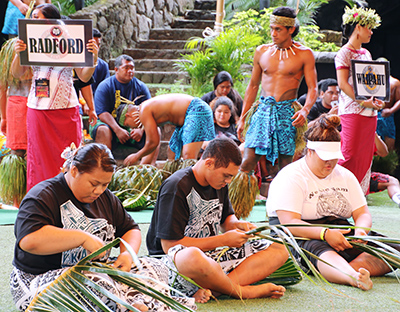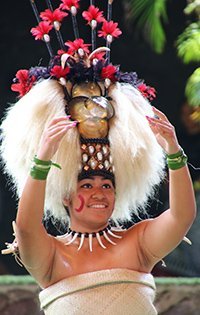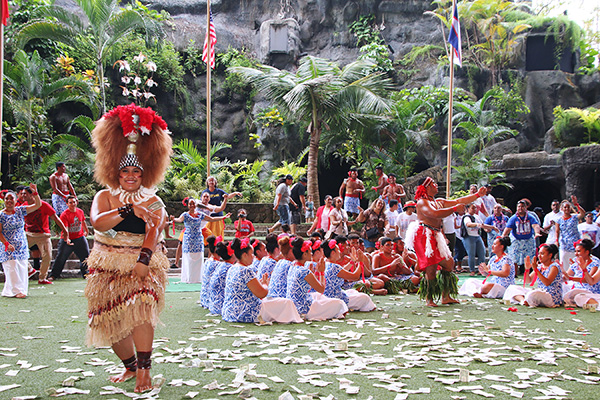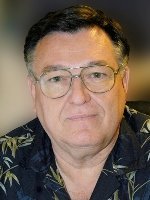Whereas three days of fire knife championship competition provides plenty of excitement and action, the PCC’s We Are Samoa High School Cultural Arts Event earlier that morning instilled a sense of pride in heritage and appreciation for the youth as they strive to maintain ties to their past.
 |
|
The students attempt to weave traditional |
As with most Samoan events, this one started with oratorical protocol, as a PCC talking chief welcomed all of the participants as well as hundreds of parents and fans. Proper respect was also paid to the anthems and flags of both the independent nation of Samoa and American Samoa.
And then it was the high school kids’ turn, starting first with the attempts by several brave school representatives at delivering stately lauga or Samoan speeches that traditionally take talking chiefs years to perfect.
Fun races followed: The mostly urban youth competed in tasks common in the daily lives of their ancestors and still practiced today in some parts of Samoa, including:
- O’a popo or coconut husking, where the dried husk is pried off mature coconuts using leverage against a sharpened stick.
- Fofo’e fa’i or green banana peeling, in which the students used a semi-dull bamboo knife to peel away the sticky green banana skins, ideally without breaking the firm fruit.
- Lalaga ato launiu or coconut-leaf basket weaving, which seems to be a vanishing art among almost all the city kids.
- And traditional si’aga afi or firemaking by rubbing two sticks together, then transferring a glowing ember into a dried coconut husk and coaxing it into flame — another skill that’s usually a challenge for most of the kids.
 |
|
Kahuku High’s taupou, |
If it’s safe to say the audience loved the games portion of the event, then we need a whole new range of adjectives to describe their appreciation for the various high schools song and dance routines that followed intermission:
For example, take energetic groups of young Samoans and friends who have inherited the historic designation of “the happy people,” mix in a high degree of enthusiasm and skill at synchronized dance movements, add the comic roles of the fa’aluma or group leaders, near the end bring on the beautifully costumed taupou representing village and family princesses performing the traditional taualuga dance, and finally inject the unbelievable element of audience appreciation and participation . . . with people flowing on stage to shower the taupou and others with money and even join in the dances. Though the emcees asked them not to come on stage, this is also an ingrained custom in Samoan culture.
Now times all of that by each of the groups that performed on Saturday morning, and if you weren’t there or didn’t watch it on live-stream internet broadcast, you get a fuzzy word picture of what a great time we all had in Laie. The audience were definitely among the winners.
 |
|
The ILH Poly Club taualuga, with students from private schools in Honolulu. |
The contributed money, plus honoraria from the PCC, went to each of the respective groups; and the high school participants were the biggest winners, as they gained greater insights into their Samoan heritage as well as a better sense of what the Samoans call fealofani — love for one another that goes beyond high school loyalty. What a great event!
Congratulations to all participants!
Kahuku High & Intermediate School
Kapolei High School
Waipahu High School
Farrington High School
ILH Poly Club (a combination of several private schools)
Radford High School (game participation only)
Story by Mike Foley

Mike Foley, who has worked off-and-on
at the Polynesian Cultural Center since
1968, has been a full-time freelance
writer and digital media specialist since
2002, and had a long career in marketing
communications and PR before that. He
learned to speak fluent Samoan as a
Mormon missionary before moving to Laie
in 1967 — still does, and he has traveled
extensively over the years throughout
Polynesia and other Pacific islands. Foley
is mostly retired now, but continues to
contribute to various PCC and other media.

Recent Comments